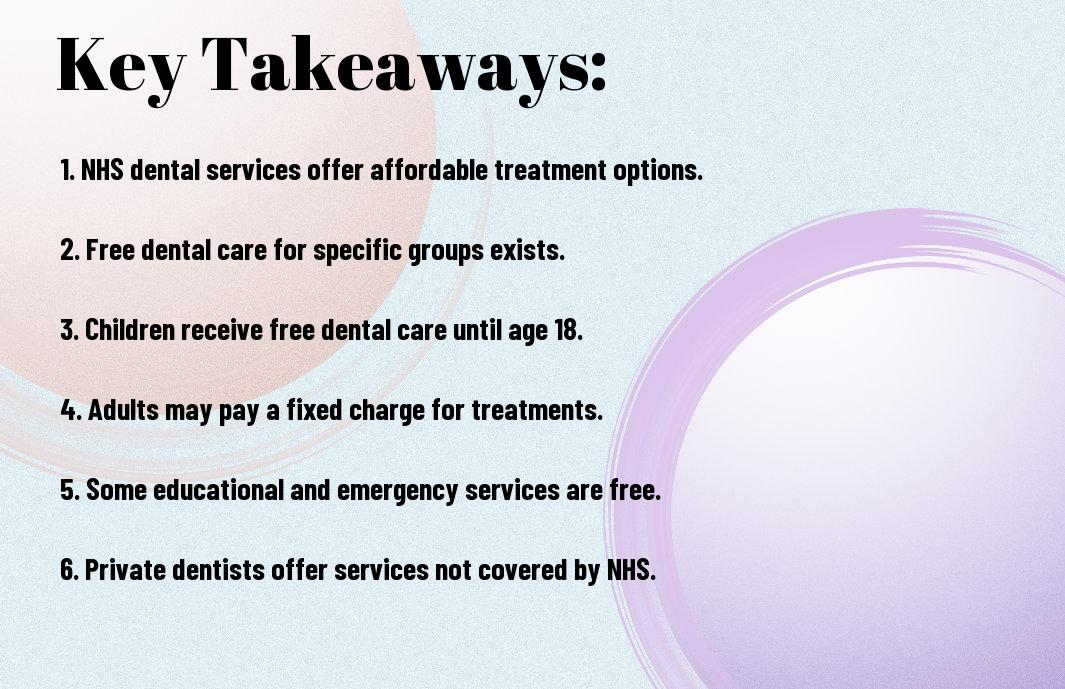It’s common to wonder about dental care costs in the UK, especially when considering your oral health needs. While some dental services are available for free under the National Health Service (NHS), not everything is covered, and certain conditions apply. In this post, you’ll discover which dental treatments you can access without charge, the requirements to qualify for free services, and alternative options if you need more extensive care. Understanding these details will help you navigate your dental health more effectively.
Key Takeaways:
- NHS Services: Dental services are provided by the NHS, which means some treatment may be free or offered at a reduced cost.
- Eligibility: Certain groups, such as children, pregnant women, and those on specific benefits, may qualify for free dental treatment.
- Charges: Most adults will have to pay a charge for dental services under the NHS, though these fees are standardized.
- Private Care: Private dental practices typically charge for all services and do not offer free dental care.
- Check Local Options: It’s important to check with local dental practices to determine the availability of free or low-cost services.

Understanding NHS Dental Services
For many people, accessing dental care through the NHS can be both convenient and affordable. The NHS provides a range of dental services, and you can explore How to Pay for Dental Treatment in the UK to understand your options better. While most treatments are not free, you may find that certain services come at little or no cost depending on your circumstances.
Overview of NHS Dentistry
Behind the structure of NHS dentistry, you will find a system designed to ensure that a broad range of dental services is available to the public. These include preventive care, such as check-ups and cleaning, as well as treatment for dental issues. While some services require payment, the NHS strives to keep dentistry accessible, preventing the deterioration of oral health among patients.
Eligibility for Free Dental Care
Understanding your eligibility for free dental care can be beneficial. Various factors can qualify you for free NHS dental treatments, such as age, income, or specific health conditions. If your circumstances meet these criteria, you may receive these services without incurring costs.
This eligibility encompasses several groups, including children under 18, pregnant women, and those on specific government benefits. To determine if you qualify for free dental care, you should check the latest guidelines and consult with your dentist. Providing accurate information about your circumstances will help ensure you receive applicable benefits under the NHS dental service framework.
Services Covered Under Free Dental Treatment
While dental care in the UK offers significant benefits through the National Health Service (NHS), not every service is included for free. You can access vital treatments without charge, designed to ensure that your dental health remains a priority. These services aim to prevent and treat dental issues effectively, reducing both pain and long-term complications.
Essential Services Provided
Essential services provided under the NHS include routine check-ups, necessary X-rays, fillings, and extractions. These treatments are aimed at maintaining your oral health and addressing any immediate dental concerns, ensuring you receive appropriate care for your smile and overall well-being.
Exclusions and Limitations
With free dental treatment, there are certain exclusions and limitations you should be aware of, such as cosmetic procedures and some advanced treatments. While NHS services prioritize necessary care, not everything is included under the free umbrella, and it’s important to understand what is and isn’t covered.
In fact, many cosmetic treatments, like teeth whitening or orthodontics for aesthetic purposes, do not qualify for NHS coverage. Additionally, some more specialized services, such as dental implants or treatments for complex dental issues, may also incur costs. Be sure to check with your dentist regarding your specific needs and understand the financial implications before proceeding with any treatment that falls outside the standard NHS offerings.
Private Dentistry in the UK
Once again, private dentistry offers a range of services beyond what is typically available through the NHS. While private practices can provide faster service and a broader array of cosmetic treatments, this often comes with a higher price tag. You may choose this option for more personalized care, extended appointment times, and the latest dental technologies, ensuring you receive the best possible attention for your dental needs.
Comparison with NHS Services
Across the UK, you can find distinct differences between private dental care and NHS services. The following comparison outlines key factors to consider:
Comparison of NHS and Private Dentistry
| NHS Services | Private Dentistry |
| Lower costs with set fees | Varied costs depending on the treatment |
| Limited treatment options | Comprehensive range of services |
| Longer waiting times | Faster access and appointments |
| Basic dental care | Cosmetic and elective procedures |
Cost Implications
Any decision to seek private dentistry often involves evaluating the cost implications. Private dental care can be significantly more expensive than NHS services, which may lead you to reconsider the choice based on your budget and needs.
A thorough understanding of costs associated with private dental services can help you make an informed choice. Treatments like dental implants, orthodontics, and cosmetic procedures can vary widely in price, and you may need to consult with several practices to compare estimates. Factor in ongoing maintenance and potential additional treatments for a complete financial picture, ensuring your chosen option fits within your budget.

How to Access Free Dental Care
Not all dental services in the UK are free, but you can access costs covered by the NHS for certain treatments. To find free dental care, you will typically need to be eligible. This includes specific groups, such as children, pregnant women, and those on certain benefits. Always check with your local NHS authority to understand your entitlements.
Finding NHS Dentists
Among the best ways to find NHS dentists is by visiting the NHS website, where you can search for locations in your area. You can also call your local NHS office for assistance. Make sure to verify that the practice you choose is accepting new NHS patients to access services without additional charges.
Making Appointments
Finding an NHS dentist is only the beginning; making an appointment is equally vital. You can do this by calling the dental practice directly or using their online booking system, if available. Be sure to have your NHS number handy, as this can help facilitate the process.
Care should be taken to provide accurate information when making your appointment. It’s advisable to mention any specific dental issues you wish to address, so the staff can allocate sufficient time and resources during your visit. Additionally, if you have to cancel or reschedule, make sure to do so promptly to allow others the opportunity for care.
Financial Considerations
To determine whether dental services are free in the UK, it’s crucial to explore the financial aspects involved. While NHS dental care is generally accessible without charge for certain eligible groups, understanding what this includes and what it does not can help you prepare for any potential costs. You’ll find that factors such as your eligibility, the type of treatment, and the dental practice you choose can influence your overall expenses.
Charges for Non-Eligible Patients
Patients who do not qualify for free dental care may face charges based on the type of treatment received. These charges can vary significantly, depending on whether you’re seeking basic check-ups or more extensive procedures. If you fall outside the exempt categories, it’s wise to check with your dental office about their specific pricing structure to ensure no surprises at checkout.
Dental Benefits and Exemptions
Financial exemptions are available for specific groups, such as children under 18, pregnant women, and those on certain benefits. These exemptions help you access necessary dental care without the burden of costs, making it easier to maintain your oral health.
Plus, if you meet certain criteria, you may qualify for an NHS Dental Treatment Voucher, which can further reduce your out-of-pocket expenses. It’s also important to note that some dental services may be partially subsidized, depending on your circumstances. Exploring these options can significantly lessen your financial load when seeking dental care, so be sure to inquire about your possible eligibility during your next visit.
Common Misconceptions
All too often, there are misunderstandings surrounding the availability and costs associated with dental care in the UK. Many people assume that all dental treatments are completely free under the National Health Service (NHS), leading to confusion regarding what is covered and what might incur charges. This misconception can result in uncertainty about seeking necessary dental care.
Myths About Free Dentistry
To debunk some myths, it’s important to understand that while basic dental services are available under the NHS, not all treatments are provided free of charge. You may need to pay for certain procedures, especially if they go beyond routine check-ups and fillings.
Clarifying Misunderstandings
At the same time, many people are unaware of the tiers of dental treatments available and their respective costs. NHS dentistry divides services into three pricing bands, where you might pay a fixed fee for varying levels of treatment. This structured system can sometimes lead to confusion regarding what you will be charged.
Also, it’s worth noting that individuals who are eligible for certain exemptions, such as low-income families or those under specific circumstances, may receive dental care at no cost. Understanding the range of services available to you and the associated fees can help navigate your dental care options more effectively. Informed individuals tend to make better choices about their oral health, ensuring they receive the treatments they need, when they need them.
Conclusion
Conclusively, while dental care in the UK is not entirely free, you can access NHS dental services at reduced rates, and certain groups may qualify for free treatments. It’s important for you to understand that regular check-ups and preventive care can help maintain your oral health and potentially reduce future treatment costs. Always check with your local NHS practice for specific fees or exemptions that may apply to your circumstances.
Q: Is dental treatment free for everyone in the UK?
A: In the UK, dental treatment is not free for everyone. However, there are specific groups of people who may qualify for free dental services. These include children under the age of 18, pregnant women, and individuals receiving certain benefits such as Income Support or Universal Credit. It’s important to verify your eligibility by checking with your local NHS authority or dental practice.
Q: How can I access free dental treatment in the UK?
A: To access free dental treatment in the UK, you need to fall into one of the eligible categories set by the NHS. If you believe you qualify, you will need to provide proof of your eligibility, such as a prescription exemption certificate or benefit documentation, during your dental appointment. It’s advisable to contact NHS dental practices directly to discuss your situation and ensure you bring the necessary documentation.
Q: Are there any costs associated with NHS dental services?
A: Yes, there are costs associated with NHS dental services for those who do not qualify for free treatment. NHS dental fees vary depending on the type of treatment you receive, generally divided into three bands. Band 1 covers basic examinations and treatments, Band 2 includes more complex procedures like fillings, and Band 3 is for advanced treatments such as crowns and dentures. You can check the NHS website for the most up-to-date pricing information.






